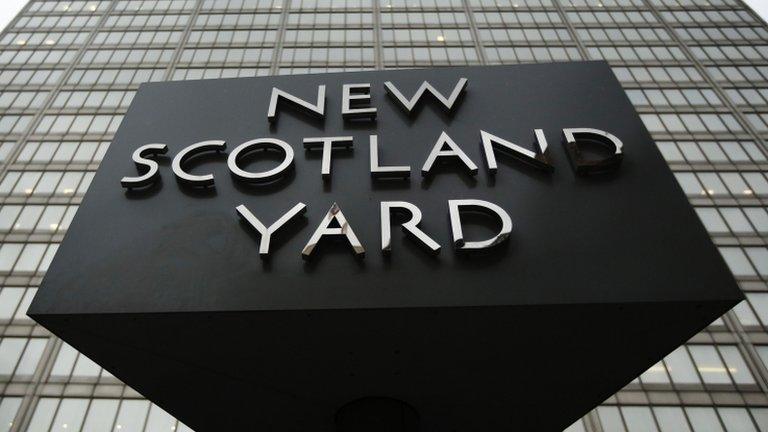'Degrading strip search left me with PTSD'
- Published
"My most overwhelming memory is the physical pain of it," said Koshka Duff
A woman subjected to a "degrading" strip search by police in London is challenging a decision not to punish the officer who authorised it.
Koshka Duff was arrested after offering a legal advice card to a black teenager during his stop-and-search.
What happened left her with multiple injuries and post-traumatic stress disorder (PTSD), the academic says.
The custody sergeant was cleared of misconduct, and the Met said it was satisfied investigations were thorough.
Dr Duff, a 30-year-old lecturer at the University of Nottingham, does not agree and is challenging the misconduct hearing's findings by way of a judicial review.
WARNING: The rest of this account includes graphic descriptions of a strip search
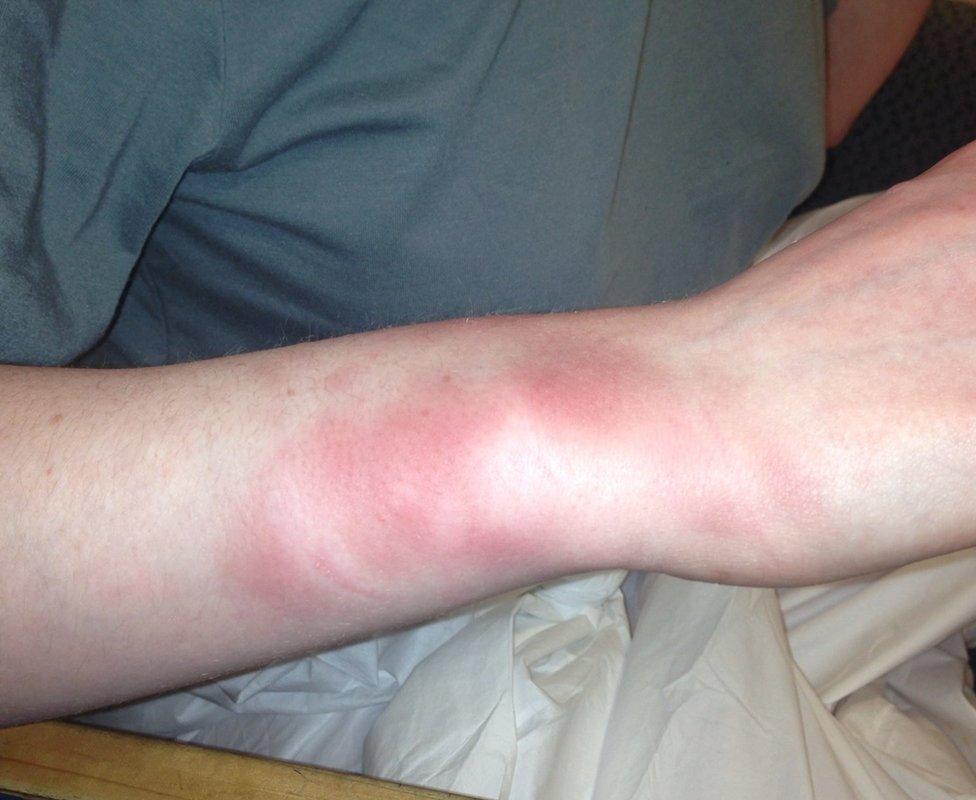
This photo of Koshka Duff's injured arm was taken while she was still at the police station
She described the strip search following her arrest on suspicion of obstruction as being a "very violating and humiliating experience".
"They caused significant injury, and subjected me to degrading treatment," said Dr Duff, who is originally from Aberdeen.
"It was three officers on top of me but it felt like it was more because they were kneeling on me with their full weight and they were all over me.
"They tied my legs together and they had my hands in handcuffs.
"They cut my clothes off with scissors and ripped out my piercings. While they were doing that they were twisting my arms around behind my back."
'Grabbed' breasts
Guidelines for strip searches say suspects should not be required to remove all their clothes at the same time - something Dr Duff said was ignored.
"When they had me completely naked they touched my breasts and between my legs," said Dr Duff.
Dr Duff went into further detail about this touching in her witness statements to the misconduct hearing.
She said the officers "grabbed" her breasts "roughly" in the process of pulling her on to her back over someone's knee.
One officer touched her genitals, she said, while someone made a comment that suggested to Dr Duff they were looking for genital piercings.
"Then they put me into a paper suit, which didn't do up properly so my breasts were partially exposed, and they carried me through the station like that," she said.
The officers were women, which is in accordance with guidelines, but strip searches should not be observed by people of the opposite sex.
Dr Duff said she heard male officers talking through the open door, and feared they might be watching.
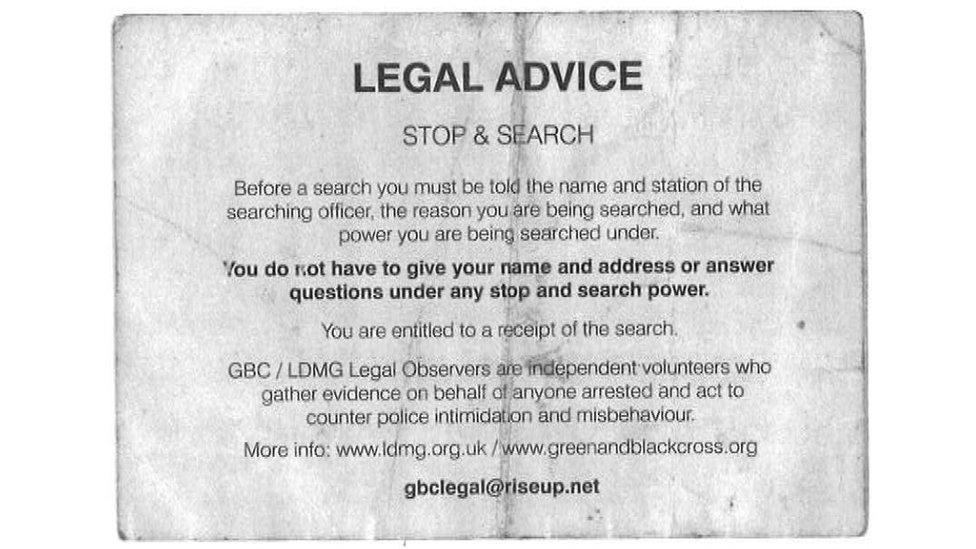
Koshka Duff was arrested when she tried to give a legal advice card like this one to a 15-year-old boy
"The purpose of the strip search I think was to punish me because they didn't like what I had done in getting in their way, offering the 'know your rights' card and then doing passive resistance and not speaking to them," said Dr Duff.
"I think they thought it would soften me up and make me give them my details by essentially subjecting me to very painful and degrading treatment in order to make me comply."
The events that led to her long-running legal battle with the Metropolitan Police took place in Hackney, east London, on 3 May 2013.
She saw police stopping and searching black people on the Wilton Estate and was concerned they were being racially profiled.
'Some sort of socialist'
Dr Duff saw officers surround a 15-year-old boy and said she decided to observe.
She then spoke to him and tried to give him a card with some legal advice on, but said police physically stopped her from doing so by grabbing her arm and blocking her way.
They then arrested her on suspicion of obstruction and assaulting a police officer.
The boy was found to have a knife, which Dr Duff had not been aware of when she intervened.
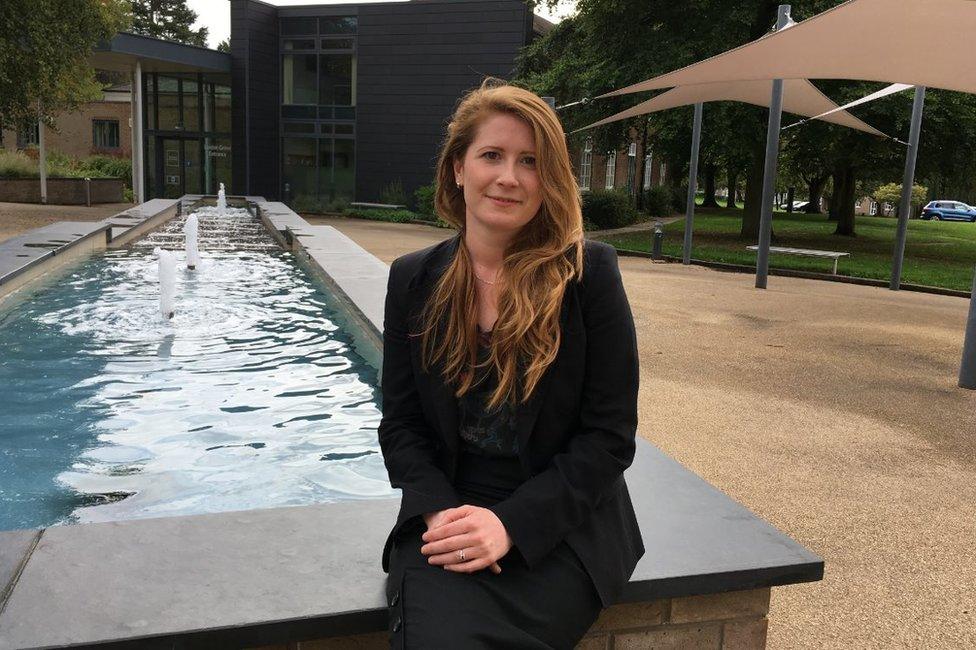
Koshka Duff described the strip search as a "very violating and humiliating experience"
She said she decided to act in the spirit of "passive resistance", and went limp rather than walking to the police van willingly.
While she was in the van Dr Duff said she heard one of the officers describe her as a "bleeding heart lefty" and "some sort of socialist".
She was taken to Stoke Newington police station, where Sgt Kurtis Howard approved the strip search.
In the detention log he noted that he was authorising it because Dr Duff "assaulted officers in the execution of their duties", "refuses to tell police her identity", "may have weapons or other items concealed", and was "being obstructive for reasons unknown".
Dr Duff was later charged with two counts of assaulting a police officer and one charge of obstructing a police officer, but was acquitted of all charges following a trial.

Was the strip search lawful?
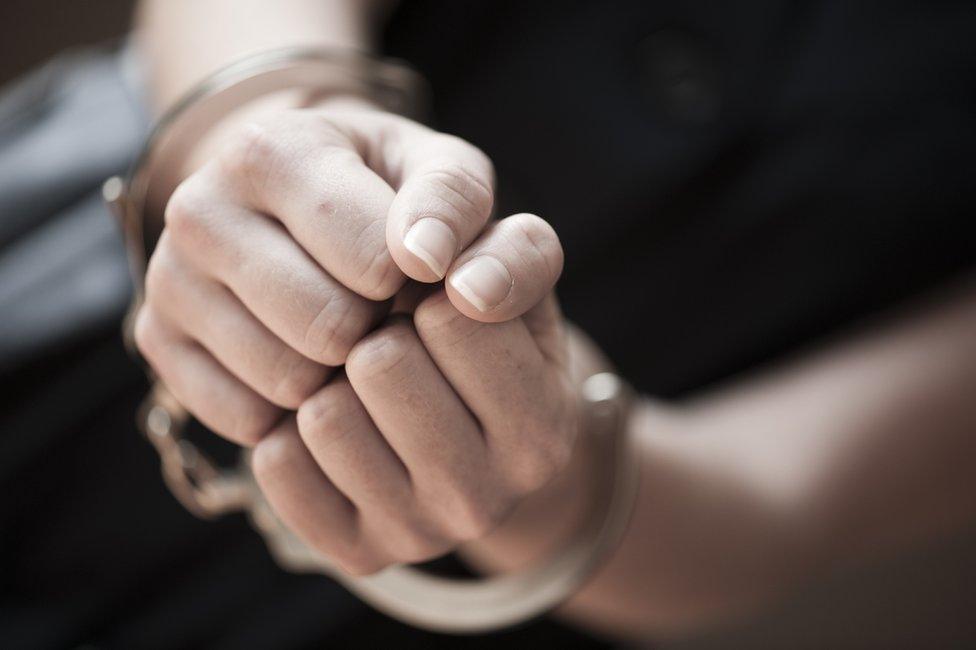
"Strip searches are usually conducted to search for evidence - typically stolen goods or drugs," said Mark P Thomas, a lecturer from Nottingham Law School.
Guidance is set out in Code C of the Police and Criminal Evidence Act 1984 (PACE), external.
This states: "A strip search may take place only if it is considered necessary to remove an article which a detainee would not be allowed to keep and the officer reasonably considers the detainee might have concealed such an article.
"Strip searches shall not be routinely carried out if there is no reason to consider that articles are concealed."
Iain Gould, a solicitor who blogs about police misconduct claims, external, believes police had insufficient grounds to strip search Dr Duff.
"On the facts available to me, this certainly seems excessive and unlawful," he said.
"There appear to have been no reasonable grounds to assume that Ms Duff was carrying a weapon on her person."

At the time of the strip search Dr Duff was a final-year masters student in piano performance at the Royal College of Music, but she says her injuries meant she could not practise for her recital and had to postpone the completion of the masters until the following year.
Her injuries included cuts and bruises on her arms and hand and a five-inch cut on her collarbone. She said the hole where a stud in her ear was removed was also very painful.
She added that she also suffered "considerable" psychological harm.
"For a few months after the incident it was intrusive thoughts about the strip search, [which] often brought on panic attacks," she said.
"I got some counselling and that condition improved, but I do experience involuntary facial spasms during flashbacks and that sometimes interferes with my work because I worry about that being noticed by my colleagues and students."
She gave up her job as a self-employed philosophy tutor because of stress relating to the incident and the court proceedings, could not pay her rent and was homeless for several months, living with various friends.
Dr Duff said her life is "back on track" five years later but she still suffers from flashbacks.
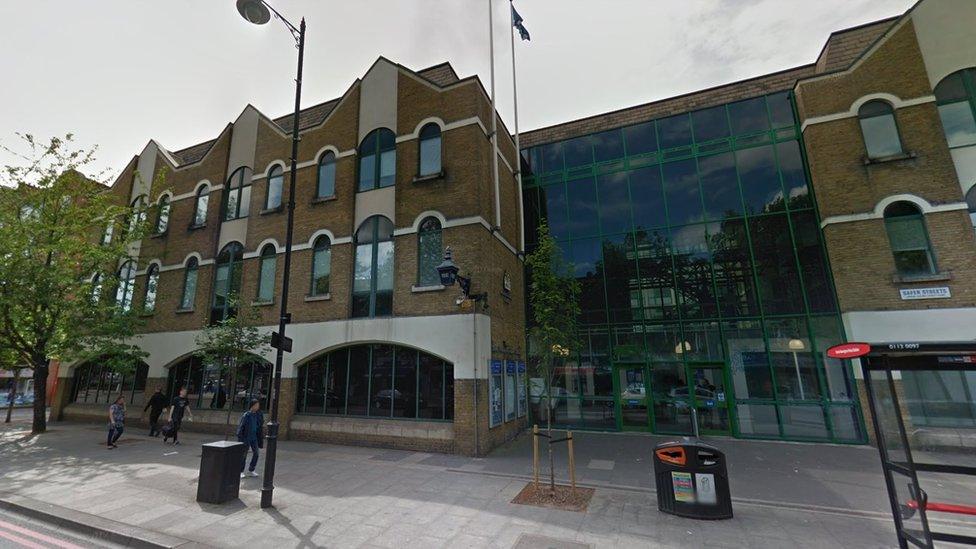
The strip search took place at Stoke Newington police station
After her acquittal, she complained and the matter went back and forth between the Metropolitan Police and what was then the Independent Police Complaints Commission (now the Independent Office for Police Conduct).
The Metropolitan Police held a misconduct hearing in August, but halfway through it Sgt Howard's defence barrister argued he had no case to answer.
The panel accepted this, meaning Sgt Howard was cleared of gross misconduct without giving evidence.
Panel chairman Maurice Cohen said there were "reasonable grounds justifying Sgt Howard's actions in authorising a strip search".
"As she was non-compliant, Sgt Howard was therefore unable to conduct a risk assessment, obtain Dr Duff's identity - which is an essential part of that risk assessment - or ascertain from her if she suffered from any mental health illness, other vulnerability or if she was on drugs," he said.
"Her behaviour was somewhat bizarre. He had a responsibility to ensure that Dr Duff did not present a risk to herself or others."
Dr Duff's lawyer, Lawrence Barker, believes there is a good prospect of the judicial review succeeding.
"In her view, the misconduct hearing was not fair and the panel did not properly apply the law. She is understandably very concerned about that, and that the same will be true in other cases," he said.
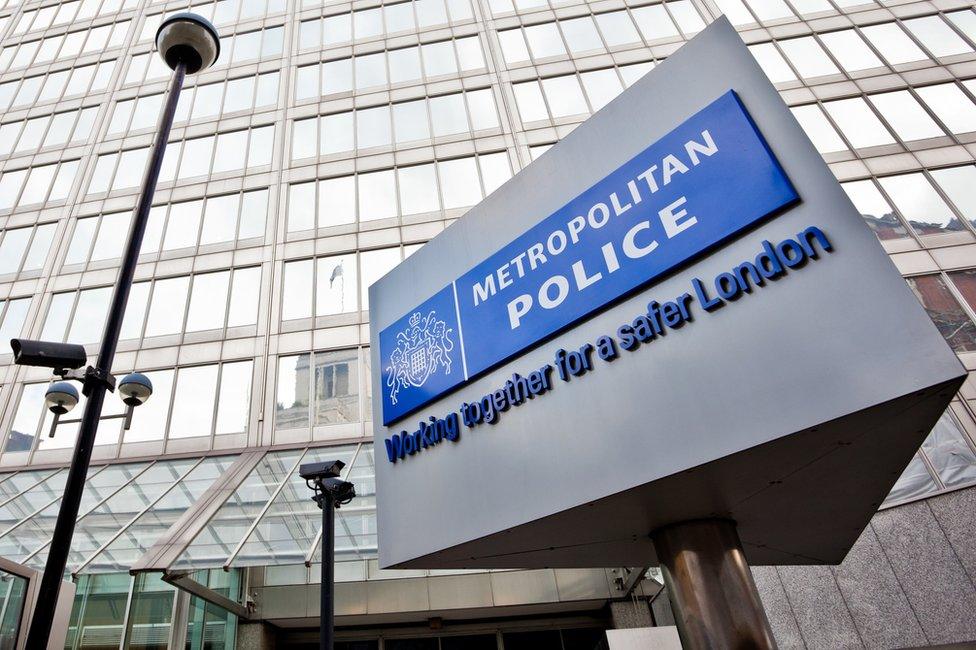
A misconduct hearing panel was satisfied there were "reasonable grounds" for the strip search
The BBC gave Sgt Howard and the other Metropolitan Police officers involved the opportunity to respond.
The force said in a statement: "Following her arrest and whilst in custody the complainant was disengaged and uncooperative.
"This made Police Sergeant Kurtis Howard's primary responsibility as custody sergeant, to risk assess all detainees for their welfare and the potential risk they may cause to themselves, other detainees and the officers dealing, very difficult."
The statement added that he "made several attempts to respectfully engage with the complainant, all of which were caught on CCTV" and that the misconduct hearing panel was satisfied he had "reasonable grounds" to authorise the strip search.
For Dr Duff, the fight to hold the police accountable for what happened to her continues.
"My sense of the misconduct hearing is that it was a sham," she said.
"The fact that the panel was happy to rubberstamp this officer's actions without even bothering to question him just makes clear to me that the violating and degrading treatment I was subjected to was far from exceptional.
"I feel we are dealing with a real culture of impunity that needs to be challenged."

To discuss an East Midlands story, contact caroline.lowbridge@bbc.co.uk, external
- Published1 July 2018
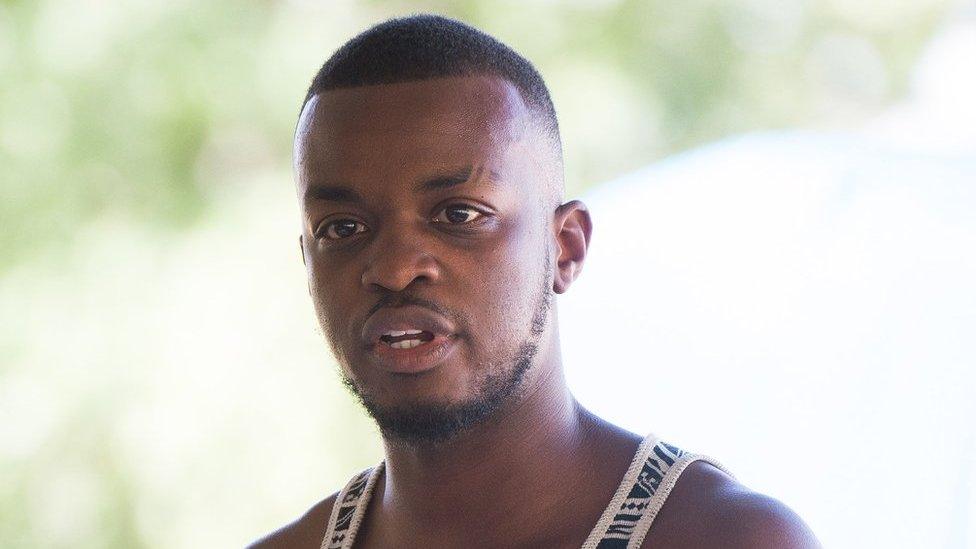
- Published3 November 2016
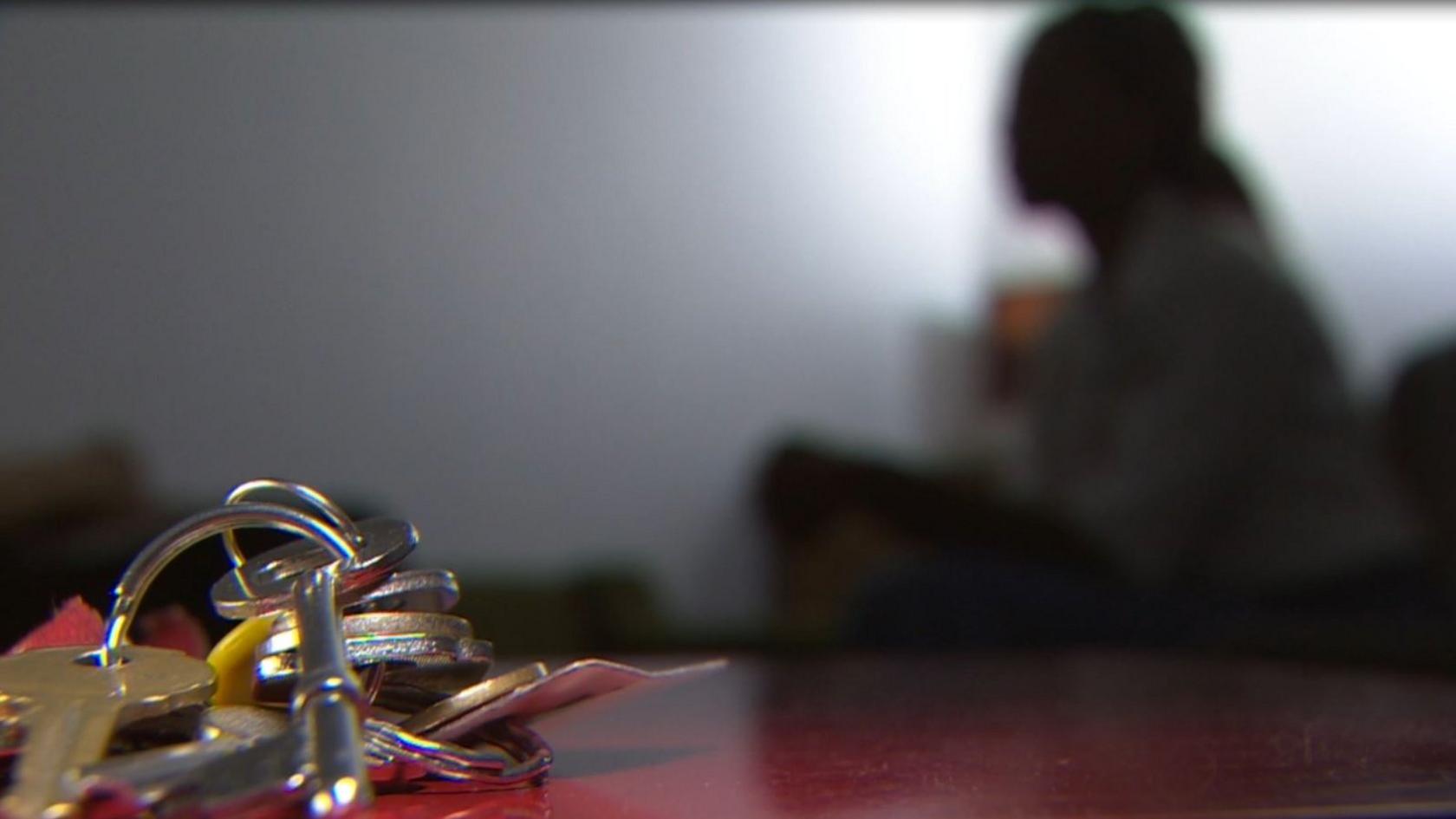
- Published17 March 2014
